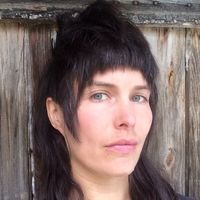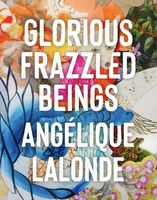September 2021 Writer-in-Residence Angélique Lalonde Explores "Home" in Her Dazzling Debut Story Collection
Journey Prize winner Angélique Lalonde's short fiction has been praised as evoking the feeling of a "contemporary classic". Her stories, with their humour, wisdom, and insight, showcase a writer who is able to craft wildly original stories that ring true.
We're thrilled to announce Angélique as our September 2021 writer-in-residence, and to welcome her to Open Book today to talk about her buzzy debut story collection, Glorious Frazzled Beings (House of Anansi Press).
Glorious Frazzled Beings explores the theme of home in unexpected ways, from ghosts in the family garden to a shapeshifting mother welcoming a baby with fox ears. Coming out just two years after her 2019 Journey Prize win, it is poised to be one of the most exciting books of the fall literary season.
Angélique, who also holds a PhD in Anthropology, joins us today to tell us about researching moon rocks and salamanders, figuring out a writing schedule as a busy parent, and three incredible story collections she's recently read and loved.
Open Book:
What do the stories have in common? Do you see a link between them, either structurally or thematically?
Angélique Lalonde:
Thematically the stories in Glorious Frazzled Beings play around the theme of Home. The collection is divided into four parts: Home Making, Housekeeping, Home Breaking, and Homing. In the first section, the stories explore the lives of characters seeking ways to make home in the world. Crafting spaces, relationships, and lives to which they might belong according to the stories they’ve inherited. In the second section, characters are living with the duties and daily realities of what it actually means to keep house and home once you’ve crafted it, and the ways that can be beautiful, exhausting, and devastating. In the third section the stories all have to do with home falling apart in some way, and in the final section, we see characters who are trying to reorient themselves to different ways of making home than through the dominant narratives and structural forces that shaped homes for them that they didn’t necessarily want to live in, and how homing in to the living world of land and place and ancestors might give a more beautiful ways to weave home.
OB:
What do you enjoy most about writing short fiction? What is the toughest part?
AL:
I began writing short fiction to explore ideas, impressions, relationships, and to play with this in curious, heartfelt, intellectually creative, and sometimes funny ways. I really enjoy the emergence of characters in short stories viewing glimpses of their stories that give a feeling for their worlds and then letting those worlds and characters go knowing there is still so much more to the story that can isn’t being told, that remains unknown.
The toughest part for me doesn’t have to do with the writing but the outside pressures that create barriers to writing. Before I had children time was not something I thought about very much. Now I write within the confines of the multiple commitments I have to people, paid work co-directing a social justice non-profit, the garden, the house chores, the land outside, and the non-human beings I’m responsible to. Short fiction, short essays, and poems feel like modes that allow me deep presence for short snippets of time in which I can play with the things I am curious about using the beautiful gift of language to approach the world around me.
The toughest part for me has to do with losing threads because I can’t carry the work with me all the time. There are a lot of other parts to living that need my attention and care and sometimes I have to let the stories go for a while before I can come back to them. Sometimes I come back and don’t remember where I was going and the stories fall away, and that can be frustrating. But sometimes they’ve continued to develop and dream while they were sleeping and they draw me back in to continue the writing. And I just have to trust that process and let some of the stories go. It can be distracting and I sometimes long for extended periods of focus that would really allow me to sit with the work in more coherent ways.
Your CanLit News
Subscribe to Open Book’s newsletter to get local book events, literary content, writing tips, and more in your inbox
But then I remind myself that in another period of life, I will have that time again, and then the stories will be different than they are now.
OB:
Did you do any specific research for any of your stories? Tell us a bit about that process.
AL:
Sometimes the characters I am writing become interested in things I know nothing about and then I have to learn about these things so that I can write about them in their stories. This sometimes looks like google searches that have me learning what kind of rocks there are on the moon, or getting a bit more knowledgeable about what kind of salamander species live in the area the characters are living and what their habits are based on other people’s research. Sometimes the characters get really specialized with their knowledge and then I have to get a bit more serious about the research, ordering books about mask making or trying my hand at various weaving techniques so that I can get a feel in my body for what the characters might be feeling. I don’t have a lot of time to do research, but it’s something I enjoy doing a great deal. Spending time with other people’s ideas or the world around me from the point of view of one of the characters I am writing, trying to process it from their worldview rather than my own, fitting these curiosities into the narratives of their stories.
Sometimes I’m lucky and the characters I am writing live where I am living and want me to go out and spend time by the river looking at lichen and getting a different kind of sense of lichen than what I’m used to, and sometimes they want to teach me about harvesting spruce tips or how I might get to know the birch tree grove down the road a little better so I can write something about it from that way of knowing. I’m always grateful when the characters want me to do research that has me hanging out with plants and trying to use the language I’m given to talk about worlds that you have to get really quiet to hear.
OB:
Do you have a favourite short story collection that you've read? Tell us why it is special to you.
AL:
Oh this one is so hard to answer because I have had so many at different times. I absolutely love short story collections. I can’t pick just one so I’ll name one that is my favourite right now, one that has been my favourite for a while, and one that I read just recently that I’m still carrying with me.
Right now my favourite collection is Lauren Groff’s Florida. It’s been a few months since I read it so I can’t remember specifically what struck me about it, but I remember being struck and surprised. Her style is just gorgeous and a little bit dark, a little bit tricky. I resonated a lot with the mother characters and the absurd trip that motherhood sometimes is. It’s also deeply embedded in place and the contemporary landscape of Florida, a place I’ve never been, but which I felt a deep embodied sense of in reading her collection. She has one story about being in a hurricane, and when it ended I emerged from the story and felt surprised that I was not in a house devastated by a hurricane. I could feel the resonance of the wind in my ears although everything around me was calm.
My longtime favourite collection is Joan Aiken’s The People in the Castle because it’s wacky and curious and there is a story called A Portable Elephant in which a person has to have a companion animal to enter the Forest of Words. I love the fantastical seeking of her stories and the twisted fairytale elements. They are stories I’m looking forward to reading to my children when they’re old enough to sit still and listen for longer periods.
I also have to mention Zalika Reid-Benta’s Frying Plantain because I read it recently and am still sitting with the voice of the main character Kara Davis, and the way Reid-Benta crafted this collection of linked stories so brilliantly. The intergenerational relationships between mothers and daughters and the ways home and identity interweave through the very different embodied worlds of Jamaica and Toronto and the love/struggles of mothers and daughters who speak, feel, fear, and experience these places so differently.
OB:
Who did you dedicate your collection to, and why?
AL:
I dedicated the collection to all the beings who have gifted me parts of their stories because that is what it felt like for me to write this collection. To sit for periods of time with the gift of each of the stories and to have the privilege, presence, and language to bring words together to write them. And it is also a homage to the beings that have gifted me parts of their stories in my living life, threads of which have would their way into the some of the stories in the collection and which bring me daily sustenance.
_______________________________________________________________
Angélique Lalonde was the recipient of the 2019 Journey Prize, has been nominated for a National Magazine Award, and was awarded an Emerging Writer’s residency at the Banff Centre. Her work has been published in numerous journals and magazines. She holds a Ph.D. in Anthropology from the University of Victoria. Lalonde is the second-eldest of four daughters. She dwells on Gitxsan Territory in Northern British Columbia with her partner, two small children, and many non-human beings.






